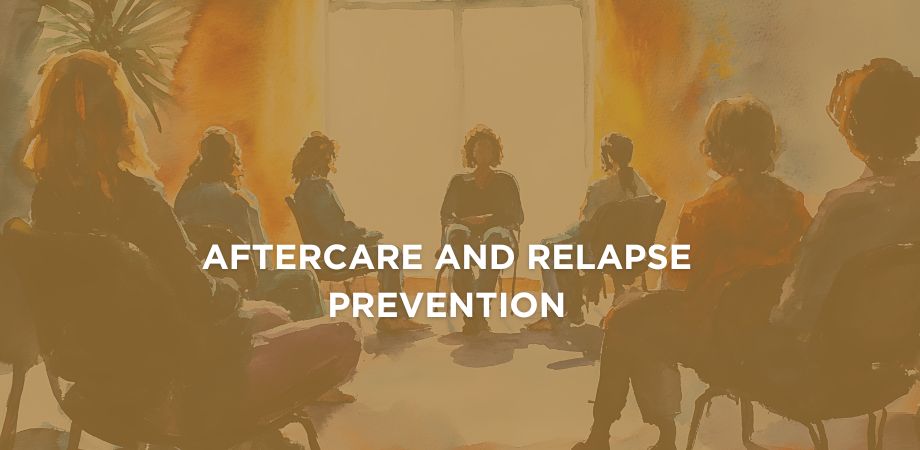Completing a rehabilitation program is a courageous step to get back your life free from the grasp of addiction. However, completing the residential program is the first step, and attaining lasting recovery starts after walking out of rehab. As individuals step back into the complexities of their lives, confronting familiar stressors and triggers, aftercare is critical to prevent relapse.
To navigate the critical phase, personalised aftercare and relapse prevention plans are crucial. These plans serve as a bridge to ensure that the person is never isolated or unequipped to manage their cravings. However, relapse is not a moral failing, but a predictable result as individuals return to their normal lives.
At Alpha Healing Center, we understand true recovery is a lifelong commitment. Our recovery plan is based on providing individuals with continued clinical support, access to support groups, medications, and other resources necessary for sustained well-being. In this article, we’ll cover why relapse occurs and discuss aftercare plans that’ll help manage long-term sobriety and well-being.
Why does Relapse Happen?
Relapse is a common issue that hampers long-term recovery after rehab. In fact, 50% of patients suffer from relapse within the first 12 months of treatment. This highlights the importance of long-term supportive management and care. Since addiction is a chronic illness, the return to substance use is usually part of the disease. As the brain reward system is altered, it may cause a person to feel the same pleasure only through the use of substances.
Addiction relapse is a gradual process, which encompasses three distinct stages: emotional, physical, and mental. The process begins even before a person consumes these substances.
- Emotional Relapse: This is the first stage of relapse, where the person is not thinking or using the substances; however, they’re neglecting self-care. The individual may start isolating themselves, have a poor diet, or have issues with their sleep cycle.
- Mental Relapse: In this stage, the individual may have deep cravings for drugs and have nostalgic feelings of the times they used the substance. They may lie to themselves about the consequences of their addiction,
- Physical Relapse: This is the stage where the use quickly escalates into full-blown addiction.
Relapse Triggers
Certain external cues or triggers make an individual get back to using drugs or drinking alcohol. Some common relapse triggers include
- Depression
- Anger
- Peer Pressure
- Withdrawal symptoms
- Stress
- Gatigue
- Insomnia
- Relationship issues
- Drug paraphernalia
- A certain smell, sight, or physical setting
The Role of Aftercare in Relapse Prevention
Aftercare is designed to help patients avert relapse by providing consistent support, accountability, and building coping mechanisms. Aftercare aims to transform the principles learned in rehab into the practical world.
Aftercare is crucial as it helps patients
- Reintegrate into Everyday Life: Aftercare enables individuals to tackle challenges/triggers they may face when returning to their families, workplaces, or social circles.
- Continued Skill Development: Rehabs teach coping mechanisms and life skills; however, aftercare helps expand upon the principles. The program allows individuals to practice them and refine these skills in real-world situations.
- Address Underlying Issues: Addiction usually stems from emotional or psychological issues. Aftercare provides individuals opportunities to explore and address these root causes, thereby preventing relapse of the same problem.
- Build Support Networks: Isolation can significantly increase the risk of relapse. Aftercare programs connect individuals with a community of peers and professionals who understand their struggles. They encourage them and hold them accountable for their actions.
Key Components of Effective Aftercare
A comprehensive aftercare plan should incorporate various elements tailored to each individual’s needs or circumstances. Below are some key components.
1. Continued Therapy and Counseling
The recovery process requires ongoing guidance to address the issues of life without the use of substances. Among them, individual and group therapy remain vital tools for addressing these issues post-recovery.
- Individual Therapy: It offers individuals a safe space to process trauma, emotions, and develop coping mechanisms with a qualified therapist. The most common therapies include Cognitive Behavioral Therapy (CBT), Dialectical Behavior Therapy (DBT), and Eye Movement Desensitization and Reprocessing (EMDR)
- Group Therapy: Allows individuals to share their experiences with others who have overcome similar issues. They can learn about their success in recovery and learn new social skills through the meetings.
2. Medication-Assisted Treatment
For certain substance use disorders, such as opioids and alcohol, therapists may prescribe FDA-approved medications alongside counselling. This dual treatment approach is effective in managing cravings and normalizing the brain chemistry. It ultimately helps significantly lower the risk of relapse.
3. Support Group Participation
There are numerous support groups like Alcoholics Anonymous (AA) and Narcotics Anonymous (NA), which have been the cornerstone of long-term recovery. These groups offer peer support and a structured framework offering a clear path for self-reflection and personal growth. Additionally, a person who has sustained sobriety will provide valuable guidance and mentorship on the path to recovery.
4. Structured Living Environments
For individuals who have a chaotic home environment that is filled with triggers, Sober Living Environments (SLEs) offer a safe and drug-free transitional space. They reinforce rules that help bridge the gap between rehab and independent living.
5. Relapse Prevention Planning
A relapse prevention plan is tailored by the rehab center as per each person’s needs. Alpha Healing Center in Mumbai entails this as their top priority before a client is discharged from the rehab. The plan includes:
- Identifying Triggers: Recognizing specific emotions, situations, places, or people that can lead to cravings or the desire to use.
- Coping Strategies: Develop healthy ways to manage stress and cravings by focusing on other activities that bring joy. This may include exercising, meditation, calling a friend/sponsor, or engaging in new hobbies.
- Emergency Plan: Identify an emergency contact and determine the steps to take if relapse seems imminent.
- Changes in Lifestyle: Making certain changes in the lifestyle of an individual, such as regular exercise, balanced nutrition, or getting more sleep. These small changes can go a great way in preventing relapse.
6. Family Involvement
Addiction has a grave impact on the entire family of the addict. Family therapy and education about the components of addiction are pivotal in the aftercare process. Developing healthy communication patterns to solve conflicts can help patients attain sobriety for longer periods.





